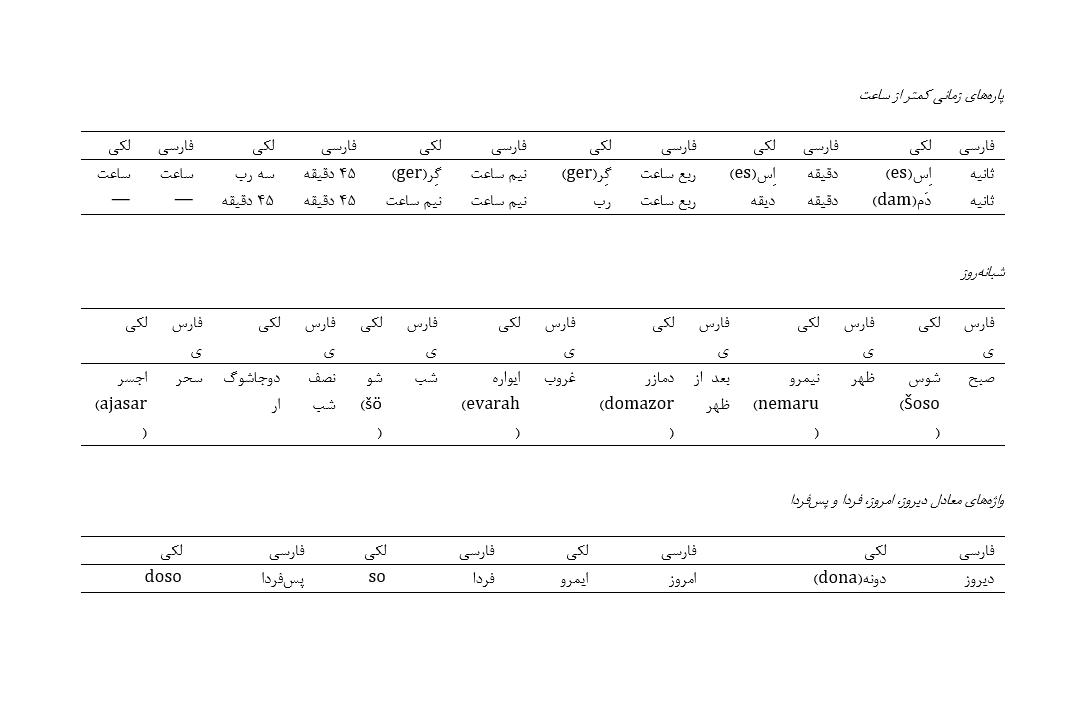بررسی بخشوارههای تقویم محلی قوم لک (مطالعه موردی استان لرستان)
کلمات کلیدی:
قوم لک, زبان لکی, گاهشماری محلی, زندگی اجتماعیچکیده
هدف این مقاله، بررسی ساختار گاهشماری لکی و مبانی آن میباشد. سؤال اصلی تحقیق بر این امر استوار است که مبانی شکلگیری گاهشماری لکی منبعث از کدامیک از وجوه زندگی آنان میباشد؟ یافتههای تحقیق نشان میدهد که این ساختار گاهشماری و مبانی شکلگیری آن، بر شیوه معیشت این قوم استوار است. این مقاله با روش توصیفی و گردآوری دادههای میدانی، اسنادی و کتابخانهای نگارش یافته است. محدوده جغرافیایی پژوهش حاضر، سه شهرستان لکنشین استان لرستان، نورآباد، کوهدشت و الشتر (لکستان) میباشد. یکی از مباحثی که مورد توجه فرهنگپژوهان و ایرانشناسان قرار گرفته است، بحث گاهشماری و بررسی تقویم و تاریخ محلی اقوام مناطق مختلف ایران است؛ لذا این موضوع هنوز در بین قوم لک بهصورت پژوهشی مستقل مورد بررسی واقع نشده است. لکها گروهی مستقل از اقوام ایرانیزبان هستند که از منظر عناصر فرهنگی کهن، دارای پیشینه غنی میباشند. گاهشماری لکی مبتنی بر نحوه سنجش زمان و محاسبه روزها، هفتهها، ماهها و یا اصطلاحات خاص زمانشناسی میباشد که منبعث از اوضاع زندگی بومی منطقهای خاص در مناطق لکنشین بوده و بهصورت سینهبهسینه محفوظ مانده است.
دانلودها
مراجع
Amanollahi, S. (1991). The Lur Ethnic Group: A Study on the Ethnic Continuity and Geographical Dispersion of the Lurs in Iran. Agah Publications.
Askari Alam, A. (2003). Fahlaviyat or Pahlavaneh: Ancient Couplets of Celebration and Mourning in the Lak Language. Aflak Publications.
Bahar, M. (1997). Several Essays on Iranian Culture. Fekr-e-Rooz Publications.
Bedlisi, A. S. K. (1964). Sharafnama: A Comprehensive History of Kurdistan. Elmi Publications.
Bedlisi, S. a.-D. (1959). Sharafnama.
Cherikov, M. (1875). Travelogue.
Curzon, G. (1994). Persia and the Persian Question. Elmi va Farhangi Publications.
Garavand, A. (1997). Destiny Poems. Shaqayeq, 1(1).
Garavand, A. (2001). The Laks in Oblivion. Conference on Lur Culture, Tehran: University of Tehran,
Homa'i, J. a.-D. (1961). The History of Persian Literature.
Hosouri, A. (1978). Kurds and Lurs: An Attempt for Further Recognition. Linguistics Research Journal, Shiraz University, 4(2).
Izadpanah, H. (1988). The Lak Shahnameh. Author.
Samadi, M. (2002). Tribes and Nomads of Kurdistan: A Document from the Era of Naser al-Din Shah. Rahro Publications.
Soltani, M. A. (2002). Tribes and Clans of Kermanshah. Soha Publications.
Taqizadeh, H. (1937). Calendars in Ancient Iran.
Vadi'i, J. (1970). Tribes and Nomads of Lorestan. Art and People(101).
Valizadeh Mo'jezzi, M. R. (1962). The History of Lorestan During the Qajar Era. Horufieh Publications.
Yasemi, R. (1990). The Kurds and Their Racial and Historical Continuity.
Yousefvand, R. (2008a). The Birth Ritual Among the Lak Ethnic Group with Reference to Its Historical Background. Iran and Caucasus Publications.
Yousefvand, R. (2008b). Doctoral Dissertation: A Comparative Study of Three Key Elements (Birth, Marriage, and Death) from the Perspective of the Lak Ethnic Group and Ancient Iranians
Yousefvand, R. (2008a). International conference iran and the caucasuse unity and diversity ,fortune telling among the lake people in iran.
Yousefvand, R. (2008b). Some Laki Demons. International journal Iran and the caucasuse, 275-279. https://doi.org/10.1163/157338408X406047
Yousefvand, R. (2013). The Popular Culture of the Lak Ethnic Group. Chavil Publications.

دانلود
چاپ شده
ارسال
بازنگری
پذیرش
شماره
نوع مقاله
مجوز
حق نشر 1404 Reza Yousefvand (Corresponding Author)

این پروژه تحت مجوز بین المللی Creative Commons Attribution-NonCommercial 4.0 می باشد.







